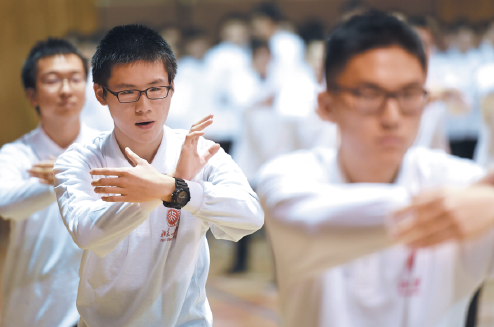 |
|
More than 140 students from Peking University take part in a tai chi competition at the campus in Beijing on Dec 23. [PHOTO BY WEI XIAOHAO/CHINA DAILY] |
Peking University has continued to require tai chi classes since the 1970s. Rewards remain obvious today, Zhang Zefeng discovers.
May the best warrior win. That was the ethos as college students from different tai chi teams prepared to compete on a recent Saturday morning. They struck powerful poses while regulating their breathing.
Traditional music served as their soundtrack.
The competition was organized by Peking University's Center for Wushu Research.
It was meant to advance students' understanding of traditional martial arts, or wushu in Chinese, after a monthlong training session.
Peking University claims a long tradition of tai chi instruction. Classes have been compulsory since the 1970s.
"All male graduates can do tai chi," says physical education department associate professor and Center for Wushu Research director Wang Dongmin.
The art of tai chi ranges from routines to actual fighting, Wang says.
It enables students to understand their bodies and become resilient.
They learn defense in a way that goes beyond foreseeing rivals' movements.
It's said to balance the body and mind.
Tai chi is often described as "meditation in motion". It focuses on the entire body's coordination and flexibility.
And it has been found to improve practitioners' balance, leg strength and flexibility. That's not to mention sleep.
It's also believed to help elderly people by strengthening their knees, hearts and minds, Wang says.